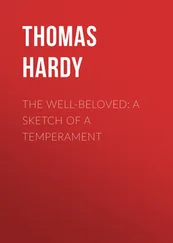"I should think not !"
"Not just once?—Oh do!" He felt that his physical weakness had taken away all his dignity.
"What do you want her to know how you are for? She don't want to see 'ee. She's the rat that forsook the sinking ship!"
"Don't, don't!"
"And I stuck to un—the more fool I! Have that strumpet in the house indeed!"
Almost as soon as the words were spoken Jude sprang from the chair, and before Arabella knew where she was he had her on her back upon a little couch which stood there, he kneeling above her.
"Say another word of that sort," he whispered, "and I'll kill you—here and now! I've everything to gain by it—my own death not being the least part. So don't think there's no meaning in what I say!"
"What do you want me to do?" gasped Arabella.
"Promise never to speak of her."
"Very well. I do."
"I take your word," he said scornfully as he loosened her. "But what it is worth I can't say."
"You couldn't kill the pig, but you could kill me!"
"Ah—there you have me! No—I couldn't kill you—even in a passion. Taunt away!"
He then began coughing very much, and she estimated his life with an appraiser's eye as he sank back ghastly pale. "I'll send for her," Arabella murmured, "if you'll agree to my being in the room with you all the time she's here."
The softer side of his nature, the desire to see Sue, made him unable to resist the offer even now, provoked as he had been; and he replied breathlessly: "Yes, I agree. Only send for her!"
In the evening he inquired if she had written.
"Yes," she said; "I wrote a note telling her you were ill, and asking her to come to-morrow or the day after. I haven't posted it yet."
The next day Jude wondered if she really did post it, but would not ask her; and foolish Hope, that lives on a drop and a crumb, made him restless with expectation. He knew the times of the possible trains, and listened on each occasion for sounds of her.
She did not come; but Jude would not address Arabella again thereon. He hoped and expected all the next day; but no Sue appeared; neither was there any note of reply. Then Jude decided in the privacy of his mind that Arabella had never posted hers, although she had written it. There was something in her manner which told it. His physical weakness was such that he shed tears at the disappointment when she was not there to see. His suspicions were, in fact, well founded. Arabella, like some other nurses, thought that your duty towards your invalid was to pacify him by any means short of really acting upon his fancies.
He never said another word to her about his wish or his conjecture. A silent, undiscerned resolve grew up in him, which gave him, if not strength, stability and calm. One midday when, after an absence of two hours, she came into the room, she beheld the chair empty.
Down she flopped on the bed, and sitting, meditated. "Now where the devil is my man gone to!" she said.
A driving rain from the north-east had been falling with more or less intermission all the morning, and looking from the window at the dripping spouts it seemed impossible to believe that any sick man would have ventured out to almost certain death. Yet a conviction possessed Arabella that he had gone out, and it became a certainty when she had searched the house. "If he's such a fool, let him be!" she said. "I can do no more."
Jude was at that moment in a railway train that was drawing near to Alfredston, oddly swathed, pale as a monumental figure in alabaster, and much stared at by other passengers. An hour later his thin form, in the long great-coat and blanket he had come with, but without an umbrella, could have been seen walking along the five-mile road to Marygreen. On his face showed the determined purpose that alone sustained him, but to which has weakness afforded a sorry foundation. By the up-hill walk he was quite blown, but he pressed on; and at half-past three o'clock stood by the familiar well at Marygreen. The rain was keeping everybody indoors; Jude crossed the green to the church without observation, and found the building open. Here he stood, looking forth at the school, whence he could hear the usual sing-song tones of the little voices that had not learnt Creation's groan.
He waited till a small boy came from the school—one evidently allowed out before hours for some reason or other. Jude held up his hand, and the child came.
"Please call at the schoolhouse and ask Mrs. Phillotson if she will be kind enough to come to the church for a few minutes."
The child departed, and Jude heard him knock at the door of the dwelling. He himself went further into the church. Everything was new, except a few pieces of carving preserved from the wrecked old fabric, now fixed against the new walls. He stood by these: they seemed akin to the perished people of that place who were his ancestors and Sue's.
A light footstep, which might have been accounted no more than an added drip to the rainfall, sounded in the porch, and he looked round.
"Oh—I didn't think it was you! I didn't—Oh, Jude!" A hysterical catch in her breath ended in a succession of them. He advanced, but she quickly recovered and went back.
"Don't go—don't go!" he implored. "This is my last time! I thought it would be less intrusive than to enter your house. And I shall never come again. Don't then be unmerciful. Sue, Sue! We are acting by the letter; and 'the letter killeth'!"
"I'll stay—I won't be unkind!" she said, her mouth quivering and her tears flowing as she allowed him to come closer. "But why did you come, and do this wrong thing, after doing such a right thing as you have done?"
"What right thing?"
"Marrying Arabella again. It was in the Alfredston paper. She has never been other than yours, Jude—in a proper sense. And therefore you did so well—Oh so well!—in recognizing it—and taking her to you again."
"God above—and is that all I've come to hear? If there is anything more degrading, immoral, unnatural, than another in my life, it is this meretricious contract with Arabella which has been called doing the right thing! And you too—you call yourself Phillotson's wife! His wife! You are mine."
"Don't make me rush away from you—I can't bear much! But on this point I am decided."
"I cannot understand how you did it—how you think it—I cannot!"
"Never mind that. He is a kind husband to me—And I—I've wrestled and struggled, and fasted, and prayed. I have nearly brought my body into complete subjection. And you mustn't—will you—wake—"
"Oh you darling little fool; where is your reason? You seem to have suffered the loss of your faculties! I would argue with you if I didn't know that a woman in your state of feeling is quite beyond all appeals to her brains. Or is it that you are humbugging yourself, as so many women do about these things; and don't actually believe what you pretend to, and only are indulging in the luxury of the emotion raised by an affected belief?"
"Luxury! How can you be so cruel!"
"You dear, sad, soft, most melancholy wreck of a promising human intellect that it has ever been my lot to behold! Where is your scorn of convention gone? I would have died game!"
"You crush, almost insult me, Jude! Go away from me!" She turned off quickly.
"I will. I would never come to see you again, even if I had the strength to come, which I shall not have any more. Sue, Sue, you are not worth a man's love!"
Her bosom began to go up and down. "I can't endure you to say that!" she burst out, and her eye resting on him a moment, she turned back impulsively. "Don't, don't scorn me! Kiss me, oh kiss me lots of times, and say I am not a coward and a contemptible humbug—I can't bear it!" She rushed up to him and, with her mouth on his, continued: "I must tell you—oh I must—my darling Love! It has been—only a church marriage—an apparent marriage I mean! He suggested it at the very first!"
Читать дальше












